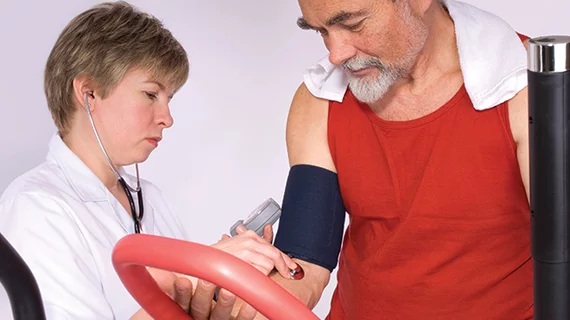Concerns about the overuse of stress testing after percutaneous coronary intervention (PCI) may be unwarranted, according to a new JAMA Network Open study.[1]
The analysis examined retrospective data from a cohort study of military veterans who underwent elective PCI at VA hospitals and completed stress testing within two years of the procedure. Of 3705 patient cases reviewed, 79.7% of those who underwent testing had symptoms that were suggestive of coronary artery disease (CAD). Only 7.1% of patients who underwent testing had no symptoms, and there was not enough information in the medical records to make a determination on symptom status for 13.2% of patients.
“The results of this cohort study suggest that concerns about the overuse of stress testing in the 2 years after PCI may be overstated, although further studies in non-VA settings are needed to examine the generalizability of the findings,” wrote Vinay Kini, MD, MSHP, of Weill Cornell Medicine, and colleagues.
Previous concerns within the medical community about overuse largely stem from the high rate of stress testing relative to the rate at which patients report symptoms. Nearly 60% of U.S. patients receive stress tests within two years of PCI, even as previous studies show that only about only 20% of patients report recurrent symptoms.
Additionally, not only is there wide variation in testing rates between different hospitals and regions, but there are also rapid increases in testing at the six month and one year mark post-procedure. The convergence around these dates suggest that tests may be driven by doctors’ recommendations rather than patient symptoms.
However, these concerns are largely built on assumptions based on administrative claims data and don’t take information from patient medical records into account, the study notes.
“Previous studies used administrative claims data to estimate the proportion of stress testing that is considered to be low value (ie, provides no net benefit) among patients with stable ischemic heart disease. In contrast, the present study supplemented administrative claims data with detailed medical record review to understand whether stress testing may have been performed in accordance with the clinical guideline,” the authors wrote.
Related PCI Content:
How a team-based approach affects care for high-risk PCI patients
Optimism boosts post-PCI recovery in patients with chronic angina
Women referred to stress testing have higher rates of psychiatric disorders than men
PCI boosts survival for ischemic HF patients with moderate-to-severe mitral regurgitation
Reference:
1. Kini, V; Parks, M; Liu, W; et al. Patient Symptoms and Stress Testing After Elective Percutaneous Coronary Intervention in the Veterans Affairs Health Care System. JAMA Network Open, June 21, 2022. DOI:10.1001/jamanetworkopen.2022.17704
